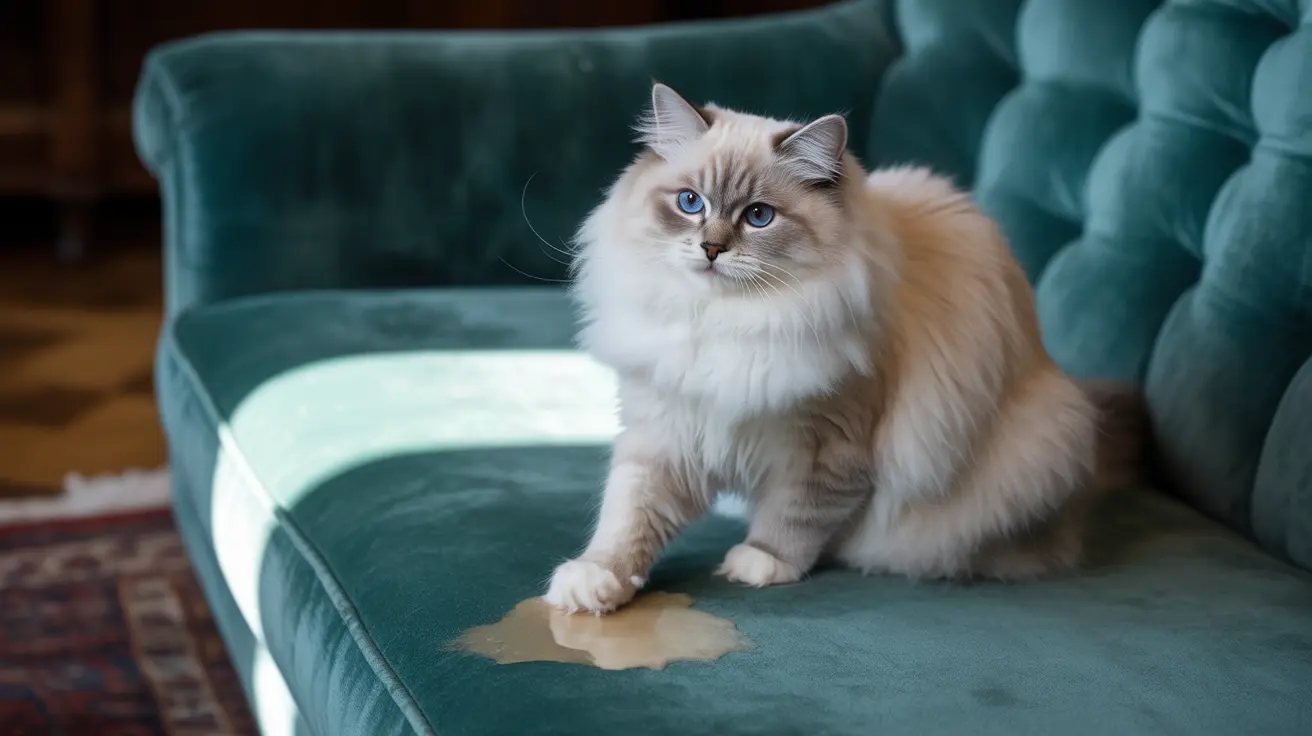Discovering your cat is peeing on furniture can be both frustrating and concerning for any pet owner. This unwanted behavior often signals underlying issues that require prompt attention, whether medical, behavioral, or environmental. Understanding why cats urinate outside their litter box and knowing how to address it effectively is crucial for maintaining both your furniture's integrity and your cat's wellbeing.
In this comprehensive guide, we'll explore the various reasons behind this common problem and provide proven solutions to help restore proper litter box habits.
Medical Causes of Inappropriate Urination
Before assuming behavioral issues, it's essential to rule out medical conditions that could be causing your cat to urinate on furniture:
Urinary Tract Problems
Urinary tract infections (UTIs), bladder stones, and crystalluria can make urination painful, causing cats to associate their litter box with discomfort. This often leads them to seek out soft, comfortable surfaces like couches or beds for relief.
Chronic Health Conditions
Diabetes, kidney disease, and hyperthyroidism can increase urination frequency and urgency, making it difficult for cats to reach their litter box in time. These conditions require immediate veterinary attention and ongoing management.
Behavioral and Environmental Factors
Litter Box Issues
Many cats avoid their litter boxes due to cleanliness concerns, inappropriate size or type, or unfavorable location. Ensure your cat has easy access to clean, appropriately-sized boxes in quiet areas of your home.
Stress and Anxiety
Changes in the household, such as new pets, moving, or schedule disruptions, can trigger stress-related urination on furniture. Creating a stable, predictable environment helps minimize these incidents.
Prevention and Solutions
Proper Litter Box Management
- Maintain at least one box per cat, plus an extra
- Clean boxes daily and replace litter weekly
- Use unscented, clumping litter
- Place boxes in quiet, accessible locations
Environmental Modifications
Create a cat-friendly environment by providing vertical spaces, hiding spots, and multiple resource stations to reduce stress and territory-related issues.
Cleaning and Deterrence
Use enzymatic cleaners specifically designed for pet urine to thoroughly eliminate odors. This prevents your cat from being drawn back to the same spots and helps break the cycle of inappropriate elimination.
When to Seek Professional Help
If your cat continues peeing on furniture despite addressing basic environmental and medical concerns, consult a veterinarian or certified animal behaviorist. They can provide specialized treatment plans and may recommend anxiety medications if necessary.
Frequently Asked Questions
What medical conditions can cause my cat to pee on furniture instead of using the litter box?
Medical conditions including UTIs, bladder stones, kidney disease, diabetes, and arthritis can cause inappropriate urination. These conditions may make urination painful or increase urgency, leading cats to avoid their litter box.
How can I tell if my cat's peeing on furniture is due to stress or a litter box problem?
Observe your cat's behavior patterns. Stress-related urination often coincides with changes in the household or routine, while litter box problems typically involve consistent avoidance of the box regardless of circumstances. Multiple cats might indicate competition for resources.
What are the best ways to clean and remove cat urine odors from furniture to prevent repeat accidents?
Use enzymatic cleaners specifically designed for pet urine, avoid ammonia-based products, and ensure thorough cleaning of all affected areas. UV blacklights can help locate all soiled spots for complete treatment.
How many litter boxes should I have and where should I place them to stop my cat from peeing on the couch?
Follow the "n+1" rule: one box per cat plus one extra, placed in quiet, easily accessible locations away from noisy areas and food sources. Ensure boxes are spread throughout your home rather than clustered together.
When should I take my cat to the vet if it starts urinating outside the litter box on soft surfaces like furniture?
Schedule a veterinary visit as soon as you notice this behavior change, especially if it's sudden or accompanied by other symptoms like increased thirst, lethargy, or changes in appetite. Early intervention is crucial for both medical and behavioral issues.
Remember, with patience, proper intervention, and professional guidance when needed, most cats can return to consistent litter box use, creating a harmonious living environment for both pets and their owners.






